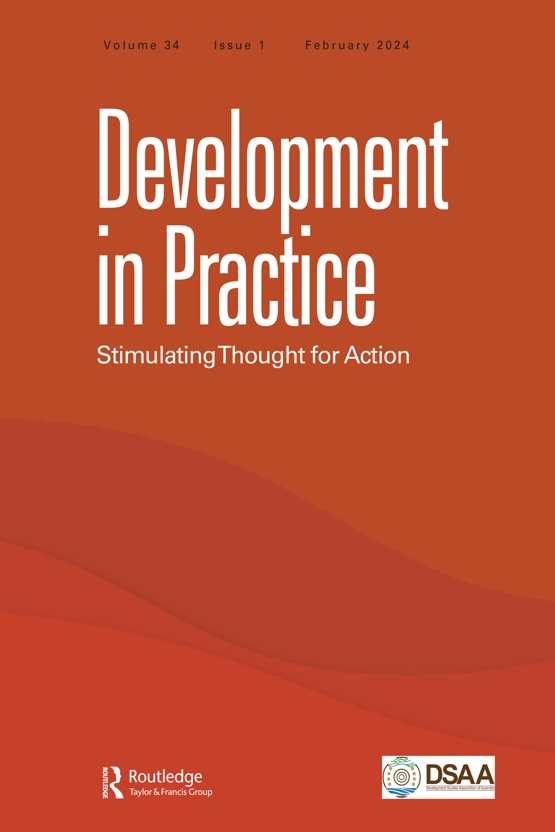Submit a Manuscript to the Journal
Development in Practice
For a Special Issue on
Approaching Climate Complexities in the South: Global Climate Action and its Effects
Manuscript deadline
15 September 2024

Special Issue Editor(s)
Weishen Zeng,
Department of International Development, University of Oxford
[email protected]
Haily Tran,
Department of International Development, University of Oxford
[email protected]
Fandi Achmad,
Department of International Development, University of Oxford
[email protected]
Approaching Climate Complexities in the South: Global Climate Action and its Effects
Climate change is defining and redefining issues of international development, changing the way we look at the developing world, and ourselves. Development studies of climate change and climate action have covered increasing topics; however, some significant issues seem to be under-explored. One of the themes that require further investigation is global climate action and its on-the-ground effects, or rather, the politics of/behind the global climate action.
Carbon emission has long-term, negative effects on the climate, and on life of millions of people. From 1792 to 2020, the landscape of global carbon emissions changed dramatically. Several leading developing countries are now emitting more than the entire developed world combined. China, for example, emitted almost 30 per cent of the world’s greenhouse gas in 2019. One of the most effective ways we can change our traditional way of production and consumption. To realise this, increasing climate-related initiatives, policies, and projects are made across the world.
However, the transition from the traditional fossil fuel-based system to a green, efficient, and modern system creates winners and losers. While appearing to be an effective policy tool to curb the emission, the social, political, and economic effects of climate action have been brought to many places, people, and institutions across the world – "injustice" seems to be inevitable in our transitions, as many have argued.
The "Global South", a geographical, political, economic, and conceptual unit associated with the so-called "underdeveloped" (or "developing") part of our world, can be particularly vulnerable to global climate action. For example, large-scale green energy projects can introduce displacements and conflicts to "Southern" people who are already marginalised. The South has also frequently been taken as a "lab" for renewable energy experiments by external forces, while its people are suffering from most of the costs of experiments. It is time for us to academically ask not only "what" the challenges are but also "how" we might deal with the problems, from a perspective of the Global South.
At the same time, the economic justice of the Global South also calls for greater attention. While we have a broad understanding of how to combat climate change – such as promoting low-carbon solutions, transitioning away from fossil fuels, and reducing overconsumption – we still grapple with the challenge of achieving economic prosperity and sustaining livelihoods in the Global South while decarbonising our planet. The delicate balance between economic development justice for these regions and the imperative to reduce carbon emissions sparks intense academic debates, yet practical solutions remain elusive. In addition, policy strategies currently undertaken by the world’s major economies, i.e. the EU Carbon Border Adjustment Mechanism (CBAM) putting additional tariffs on the imported products from the Global South, mostly constrain the role of developing nations as sources of raw materials to fuel the low-carbon technological revolution.
This special issue brings together original research that addresses interdisciplinary issues that emerge from and around global climate action. We welcome experts, authors, as well as young scholars, to discuss how the impacts of climate action intersect with existing "Southern" systems and conditions to affect many people, places, and institutions. This covers Asia, Africa, Latin America.
The special issue will include both full academic articles and shorter practice notes reflecting on learnings from practical work.
The editors of this special issue are also convening a panel (P32: Approaching climate complexities in the south: Global climate action and its actual effects) at DSA 2024. DSA2024 Conference will take place at SOAS University of London, 26–28 June 2024. We welcome you to attend our panel. See details at https://www.devstud.org.uk/conference/conference-2024/
Looking to Publish your Research?
Find out how to publish your research open access with Taylor & Francis Group.
Choose open accessSubmission Instructions
Submissions should be made through the Development in Practice submission portal. Follow the instructions to submit your manuscript. Please ensure that you tick the box for inclusion in a special issue and select "Approaching Climate Complexities in the South: Global Climate Action and its Effects" from the dropdown menu.